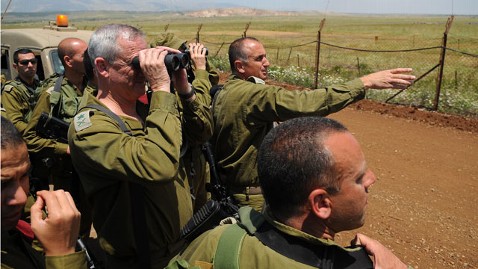Syria Fires at Israeli Vehicle, Raising Fears

The IDF's Chief of Staff Benjamin (Benny) Gantz conducted this morning an inspection on the Israeli Syrian border. He was joined by the CO Northern command Maj. Gen Yair Golan and the commander of the "Gaash" division, Brig. Gen. Tamir Heyman. Photo: Alex Marquardt/ABC News
TEL AVIV- The Syrian military said on Tuesday that it fired on an Israeli army jeep in the contested Golan Heights in the early hours of the morning, destroying it.
Israel said the jeep was slightly damaged and there were no casualties, but the incident raised fears that the long-time enemies could soon once again find themselves embroiled in renewed conflict.
Just after 1 a.m., the Israeli vehicle on patrol was fired upon by Syrian forces, both sides reported. Syria said the jeep had crossed the ceasefire line in the mountainous Golan Heights that divides the two countries and was heading to the village of Beer Ajam, on the ceasefire line. Israel said the jeep hadn't crossed but was near Tal Fares, in the Golan Heights area that Israel captured in the 1967 six-day war.
Israel responded quickly to the Syrian fire with precision Tammuz rockets and "reported a direct hit," the Israel Defense Forces said in a statement. "Our policy is clear: we do not intervene in what goes on in Syria, or in its civil war," said Israeli Defense Minister Moshe Yaalon on Israel army radio. "We do not and will not allow any Syrian fire to enter our territory. Last night a Syrian army target was destroyed as a result of such fire."
Israel and Syria are technically in a state of war, but the border has remained relatively quiet during the four decades of rule by President Bashar al-Assad and his father, Hafez, before him.
Tuesday's incident was the latest in a string of cross-border fire coming from Syria that Israel has largely dismissed as an unintentional spillover from the war raging next door between Syrian forces and the rebels. But for the first time in Syria's two-year civil war, Syria claimed responsibility for the attack on Israel.
"Whoever thinks that he is able to test our strength, alert and readiness to maintain our dignity and sovereignty is mistaken," the Syrian army's statement read. The incident comes just days after what Israel said were two mortars from Syria that landed on Mount Hermon in the northernmost part of the occupied Golan Heights. It was then partially closed to the Israeli public and a group calling itself the "Free Palestine Movement" claimed responsibility for the attack.
Fears that that the war in Syria will spill over and drag in neighboring countries are at their highest point in the 26 months since the uprising in Syria started. Tension between Syria and Israel is particularly high following three Israeli air strikes on Syrian targets in January and May. Israel has sought to tamp down the tension by not confirming or denying the strikes, believed to have been on a research center near Damascus and on shipments of Iranian missiles bound for the Lebanese militant group Hezbollah.
In response, both Assad and Hezbollah's leader, Hassan Nasrallah, warned that a new "resistance front" would be opened in the Golan Heights. "We announce that we stand with the Syrian popular resistance and offer material and spiritual support as well as coordination in order to liberate the Syrian Golan," said Nasrallah.